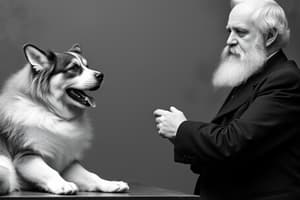Podcast
Questions and Answers
What is classical conditioning?
What is classical conditioning?
A type of learning that occurs through the repeated association of two (or more) different stimuli.
Who was Ivan Pavlov?
Who was Ivan Pavlov?
A Russian physiologist known for describing classical conditioning.
What is a stimulus?
What is a stimulus?
Any object or event that elicits a response from an organism.
What is a response?
What is a response?
Which of the following are key elements of classical conditioning? (Select all that apply)
Which of the following are key elements of classical conditioning? (Select all that apply)
What is a neutral stimulus?
What is a neutral stimulus?
What is an unconditioned stimulus?
What is an unconditioned stimulus?
What is an unconditioned response?
What is an unconditioned response?
What is a conditioned stimulus?
What is a conditioned stimulus?
What is a conditioned response?
What is a conditioned response?
Match the following key processes of classical conditioning to their descriptions:
Match the following key processes of classical conditioning to their descriptions:
Flashcards are hidden until you start studying
Study Notes
Classical Conditioning
- A learning process involving repeated associations between different stimuli.
- Learning occurs when a stimulus consistently triggers a response that did not initially occur.
Ivan Pavlov
- Russian physiologist known for his discovery of classical conditioning through experiments with dogs.
- Observed that dogs salivated not only at food but also at stimuli associated with food, like the lab technician.
- Conducted experiments using bells and other stimuli to establish associations leading to salivation.
Key Definitions
- Stimulus: An object or event that elicits a response from an organism.
- Response: A reaction by an organism in reaction to a stimulus.
Key Elements of Classical Conditioning
- Neutral Stimulus (NS): Initially does not elicit a specific response (e.g., the sound of a bell).
- Unconditioned Stimulus (UCS): A stimulus that consistently produces a naturally occurring automatic response (e.g., food).
- Unconditioned Response (UCR): An involuntary reaction to the UCS (e.g., salivation in response to food).
- Conditioned Stimulus (CS): A previously neutral stimulus that, after conditioning, elicits a response (e.g., the bell after conditioning).
- Conditioned Response (CR): A learned response to the CS (e.g., salivation in response to the bell).
Conditioning Process
- Before Conditioning: NS (bell) does not elicit a response; UCS (food) elicits UCR (salivation).
- During Conditioning: NS is paired with UCS (bell + food) through repeated presentations.
- After Conditioning: NS becomes CS (bell), which now elicits a CR (salivation).
Key Processes of Classical Conditioning
- Acquisition: The process of learning to associate the CS with the UCS; involves close temporal presentation of both stimuli.
- Extinction: The gradual weakening of the CR when the CS is no longer followed by the UCS.
- Spontaneous Recovery: The reappearance of the CR after a rest period when the CS is presented again, although often weaker than before.
- Stimulus Generalization: The tendency for stimuli similar to the CS to elicit a similar response; greater similarity leads to a higher likelihood of generalization.
- Stimulus Discrimination: The ability to differentiate between the CS and similar stimuli, responding only to the CS.
Studying That Suits You
Use AI to generate personalized quizzes and flashcards to suit your learning preferences.




